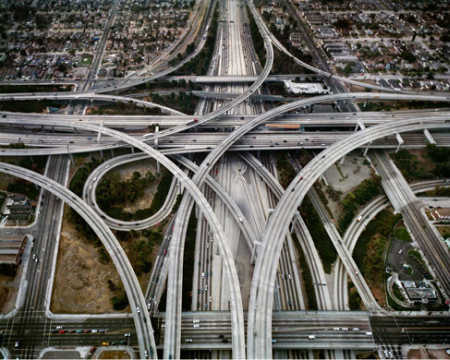Nitin Desai
Crony capitalism involves both corrupt politicians and unscrupulous businessmen in a close embrace to manipulate for private profit the discretionary powers that still rest with the government, despite liberalisation.
The allocation of publicly controlled natural resources and land is the biggest arena for this collusion. The Supreme Court judgment on the 2G case is a serious attempt at containing such collusion to steal the resource rents that rightfully should go to the public purse.
It should put the fear - if not of God then of My Lord - in the minds of politicians and businessmen who survive and thrive on crony capitalism.
The court has justifiably criticised the ostensibly non-discriminatory policy of first-come, first-served on the argument that, in our system, somebody or the other will always get or, more likely, be given advance information so that they can position themselves up ahead in the queue.
The court, like the Ashok Chawla committee, has come out strongly for one particular method of allocating the right to publicly controlled resources, and the judgment avers that: "When it comes to alienation of scarce natural resources like spectrum etc, the state must always adopt a method of auction by giving wide publicity so that all eligible persons may participate in the process."
The end of crony capitalism?
Image: Any workable auction will also have to have some qualifying criteria.Auctions or competitive bidding for allocation of scarce resources would perhaps be most economists' choice of the method most likely to lead to the allocation of resources to those who can use them most profitably.
But designing an auction requires prior consideration about how many licensees should share the resource to ensure an adequate level of competition - and that is, frankly, a judgement call that can be distorted by ulterior motives.
Any workable auction will also have to have some qualifying criteria on who is eligible to compete, and that is even more liable to manipulation.
Moreover, our experience shows that disclosure requirements are often lax enough to allow someone to corner resources through front companies.
Auctions or competitive bidding can be used when there are technical or logistical reasons for apportioning and giving licensees de facto ownership rights.
But that is not always necessary. An alternative could be to provide open access to the resource to all eligible users against a usage charge, which would be calibrated to ensure that the demands on the resource match availability.
Take a hypothetical and perhaps bizarre example. Suppose there is an expressway that can take 100,000 cars between two cities.
The end of crony capitalism?
Image: Open access is the preferred alternative for roads and similar network facilities.The auction approach would divide this capacity into, say, four lots of 25,000 each and auction it to four winning bidders.
They, in turn, would sell individual motorists the right to use the road to recover the upfront capital fee they pay to the government.
The alternative approach would make this an open-access toll road accessible to anyone willing to pay the toll, with congestion being managed by adjusting the toll rate to match demand and availability.
In practice, open access is the preferred alternative for roads and similar network facilities. There are some who argue that this is possible for the telecom spectrum, where modern technology obviates the problem of interference.
Open access with pay-per-use is much better for maintaining competition and easing entry by new players. Take electricity distribution, for instance. Today we have competition for markets but not competition in markets.
Once a distribution concession is given to a company, consumers in the supply area have no choice and their interests have to be protected by a regulatory authority that can be captured and suborned.
But if effective open access to grid and distribution networks is enforced, then multiple suppliers can operate in the same region - and this competition may do more to help consumers than regulatory oversight over tariffs.
The end of crony capitalism?
Image: Ocean fisheries is an example of the consequences of open access for a depletable resource.Open access will not work well when the resource depletes with overuse. It would lead to what has been described as the tragedy of the commons, where it is in the commercial interest of each user to extract as much as possible without regard to optimum rates of exploitation.
Ocean fisheries provide a sad example of the consequences of open access for a depletable resource. When a resource can be over-exploited, the right of access to the resource has to be organised so as to create incentives for staying within sustainable yields or by setting up barriers to excessive exploitation.
One approach, typically followed in mineral and oil concessions, is to give the licensee long-term rights over a well-defined resource block.
In principle, the licensee should be interested in avoiding unsustainable rates of exploitation that reduce his total return over time. Another approach, typically followed in forestry, is to give short-term rights of access with controls that specify the amounts that can be extracted.
This approach depends on honest and effective policing, and the evidence from the past history of forestry in India does not give any grounds for confidence that it would work.
Externalities complicate the picture substantially as optimal rates of exploitation are not the same as sustainable yields.
The end of crony capitalism?
Image: Precedent set by the 2G case will lead to every resource allocation being challenged.Designing incentive-compatible systems of resource concessions that protect the interest of those affected by the externality is difficult.
The right approach is to take care of this through tax/subsidy or regulatory measures that are part of the general policy framework within which the concessionaire has to operate.
The government must not assume that auctions that transfer property rights to a few parties are always the right answer. If regulated open access is not possible, the goal must be to eliminate the discretionary powers of politicians and bureaucrats to choose concessionaires, who should be chosen through a system of public auctions, both for outright transfer of rights or for public-private partnerships.
The aim must be to minimise the private appropriation of resource rents, ensure free and fair competition and create incentives for each user to stay within the limits of optimal exploitation.
A truly transparent and honest system will require some independent scrutiny of the design and the rules of process that all resource concessions should follow.
Perhaps some central legislation on this matter, and extending the remit of the Competition Commission of India to exercise oversight on the implementation of this legislation, may be the route to follow.
Either that or the precedent set by the 2G case will lead to every resource allocation being challenged.







article